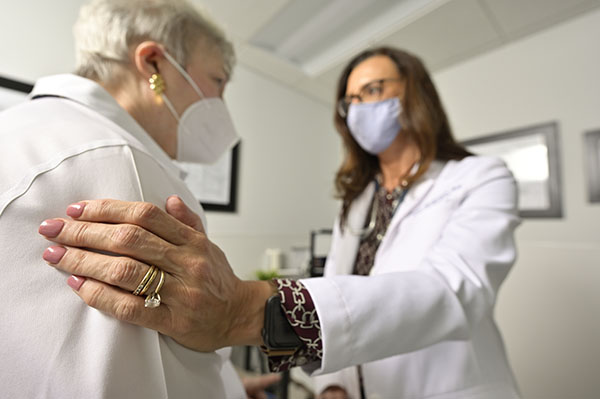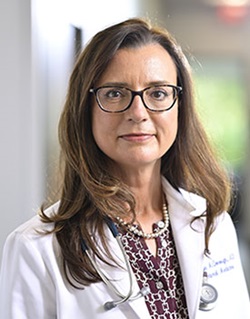
The chaotic early months of the pandemic are still close to the surface for Renee McDonough, MD, who was, at the time, the lead physician at a local nursing home in Glen Mills, PA. She's since accepted a new position, as Associate Medical Director of Senior Living, a new program at Chester County Hospital.
Throughout our region awareness heightened that COVID-19 spread much faster than common viruses. And in older adults, it was more lethal. Working seven days a week, Dr. McDonough and her staff scrambled to isolate and care for residents who tested positive, a challenge made all the more difficult by the physical limits of a full building.
However, the hardest part – the part that exacted the greatest physical and emotional toll – was standing in for the family. "Because of the nature of the virus, a lot of residents passed away without being with their families," Dr. McDonough says. "Before this, it was unheard of to be kept apart from loved ones when you’re dying."
SAYING GOODBYE BECOMES EVEN HARDER
 She and her staff, dressed head to toe in personal protective equipment, sat bedside and connected residents with their families via FaceTime. It was a clear compromise, but it was the only option the situation would allow. As a result, Dr. McDonough was thrust, time and again, into the uncomfortable position of witnessing a person’s last goodbyes.
She and her staff, dressed head to toe in personal protective equipment, sat bedside and connected residents with their families via FaceTime. It was a clear compromise, but it was the only option the situation would allow. As a result, Dr. McDonough was thrust, time and again, into the uncomfortable position of witnessing a person’s last goodbyes.
"When I was a resident, I would work a 48-hour shift in an intensive care unit where 10 people might die in a single night," she says. "I was exposed to a lot of death, and I learned how to communicate with families in those moments."
She chokes back tears remembering a FaceTime call between one of the nursing home's first residents diagnosed with COVID-19 and her family.
"There were several family members on the call, and everyone was crying," Dr. McDonough says. "Eventually, the patient said, 'It’s time to go'. She turned her head, and the patient was gone within a few hours."
While the sharp rise of COVID-19 variant infections in recent months is concerning – particularly for older adults, more vulnerable to severe manifestations of the virus because they have weaker immune systems than most – Dr. McDonough is confident we won’t experience a repeat of the spring of 2020.
"In the first wave, we were unprepared. We didn’t know what COVID was," she says. "By the second wave, we were testing frequently, and we knew isolation was key to preventing spread. Now, we're blessed not only with effective vaccines but also treatments."
RESTORING THE HOUSE CALL
Dr. McDonough spent the first part of her career in family medicine, where the majority of her patients were older adults. She relished treating multiple health concerns simultaneously, as was the case with many of her older patients. And she enjoyed getting to know them.
"I've met all kinds of interesting people who have seen and done so much," she says.
Senior HealthLink: Improving Health and Addressing Loneliness Among Senior Citizens
Senior HealthLink (SHL), part of Penn Medicine at Home, is a free and voluntary program that supports the physical, emotional, and nutritional needs of at-risk-seniors while simultaneously offering practical experience for nursing students.
The need for extended services to maintain health and independence among this vulnerable population was identified more than 30 years ago by a visiting nurse from a local home care agency.
While the cornerstone of Senior HealthLink is home visitation by student nurses, services have expanded over the last three decades since the program’s inception to include:
- A community resource phone line 610-431-1852
- Health education programs
- Screenings where seniors gather or reside throughout the county
At the onset of COVID-19, the SHL team swiftly developed an additional service - telephonic health visits. This enabled the program to safely maintain contact with clients as they were forced to shelter-in-place. On these phone calls, clients openly shared their feelings of loneliness and isolation due to the pandemic. As a result, more frequent phone calls were scheduled to provide additional assistance.
"Ample research has shown that loneliness can decrease life expectancy so when our clients began to express feelings of loneliness, stress, and anxiety about not being able to see family, friends, or their healthcare providers, we knew we had to do something. The telephone visits were like a lifeline, bridging the gap between our clients and necessary resources," shared Mary Jo Baldino, BSN, RN, who manages the Senior HealthLink program.
Home visitations resumed at the end of 2020 however, given the success and positive feedback of telephonic visits, SHL has continued that offering, as well. "This hybrid approach has allowed our services to expand into a larger geographic area, increase frequent contact with our most vulnerable clients, and the growth of the number of seniors served by the program," Jean Herb, MSN, RN, Senior HealthLink outreach nurse, said.
If you are interested in participating in the Senior HealthLink program, please call 610-918-6530 or email Mary Jo Baldino at maryjo.baldino@pennmedicine.upenn.edu.